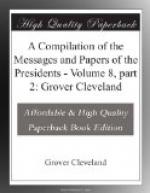Before concluding, fellow-citizens, I must say something to you on the subject of the parties at this time existing in our country. To me it appears perfectly clear that the interest of that country requires that the violence of the spirit by which those parties are at this time governed must be greatly mitigated, if not entirely extinguished, or consequences will ensue which are appalling to be thought of.
If parties in a republic are necessary to secure a degree of vigilance sufficient to keep the public functionaries within the bounds of law and duty, at that point their usefulness ends. Beyond that they become destructive of public virtue, the parent of a spirit antagonist to that of liberty, and eventually its inevitable conqueror. We have examples of republics where the love of country and of liberty at one time were the dominant passions of the whole mass of citizens, and yet, with the continuance of the name and forms of free government, not a vestige of these qualities remaining in the bosoms of any one of its citizens. It was the beautiful remark of a distinguished English writer that “in the Roman senate Octavius had a party and Antony a party, but the Commonwealth had none.” Yet the senate continued to meet in the temple of liberty to talk of the sacredness and beauty of the Commonwealth and gaze at the statues of the elder Brutus and of the Curtii and Decii, and the people assembled in the forum, not, as in the days of Camillus and the Scipios, to cast their free votes for annual magistrates or pass upon the acts of the senate, but to receive from the hands of the leaders of the respective parties their share of the spoils and to shout for one or the other, as those collected in Gaul or Egypt and




